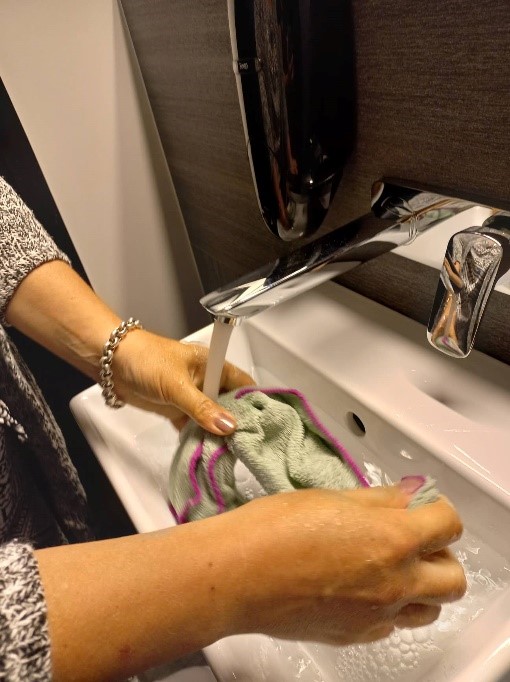info@puhastusekspert.ee +372 5611 1048
What happens if cleaners do not have enough cloths?
Recently, we have carried out a number of interesting cleaning audits to find potential for improving cleaning efficiency.
Here are some examples of what happens when a cleaner does not have enough cloths to be able to switch to a clean one when the previous cloth gets soiled to then wash them all together in the washing machine at the end of the day.
Washing in the sink
 If you do not have enough cloths, the solution is often to wash existing cloths in a sink. However, in this case, th
If you do not have enough cloths, the solution is often to wash existing cloths in a sink. However, in this case, th
e microfibre cloths are not cleaned sufficiently and end up too wet. The cloth then does not clean, but rather smears.
Case study in numbers. Results:
- It took 1.5 minutes and 3 litres of water to wash one cloth in the sink.
- If 10 cleaners wash cloths 20 times a day in this way, the total accumulated daily working time is about 5 hours.
- If this is done every day for a year for remuneration equivalent to the minimum wage, the company ends up paying €11,100 for work that creates no value. That is significantly more than the cost of purchasing microfibre cloths, a trolley or even a washing machine.
- It requires 600 litres of water per day. Based on the above, this activity consumes about 180 tonnes more water per year than washing cloths in a washing machine.
Use of paper towels
If cloths are washed in the sink or get wet/soiled for other reasons, it creates the need to dry surfaces such as taps and sinks. Paper towels are often used for this purpose. In a recent audit, we counted how much paper was actually used. On that particular day, the result was 5-7 sheets per toilet. Continuing with the previous example, if the same is done in 100 rooms, cleaners end up using an average 600 sheets of paper per day just for drying surfaces. In this particular establishment, the cost of paper towels was 0.8 cents per sheet, so the total cost of paper for drying amounts to €4.8 per day, plus waste disposal. The annual cost of paper for drying is €1752. Drying with a microfiber cloth will certainly give a much better result.
It is important to reduce the workload of employees, avoid unnecessary use of water, and find ways to maximise the return on time spent cleaning.